ing做补语
动词的-ing形式作表语,定语,宾语补足语
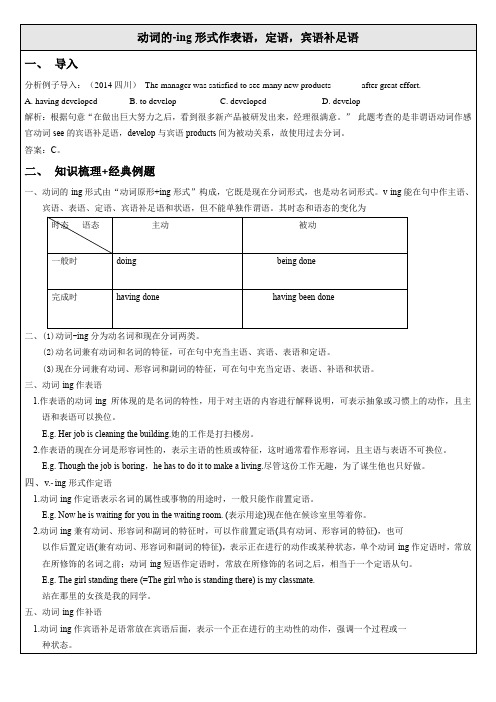
1)位于感官动词后(see,hear,feel,smell,watch,find,notice等)。
E.g.I felt somebody patting me on the shoulder.我感到有人拍我的肩膀。
动词的-ing形式作表语,定语,宾语补足语
一、导入
分析例子导入:(2014四川)The managerwas satisfied to see many new products ______ after great effort.
A. having developedB. to develop C. developedD. develop
时态语态
主动
被动
一般时
doing
being done
完成时
having done
having been done
二、(1)动词-ing分为动名词和现在分词两类。
(2)动名词兼有动词和名词的特征,可在句中充当主语、宾语、表语和定语。
(3)现在分词兼有动词、形容词和副词的特征,可在句中充当定语、表语、补语和状语。
2.动词-ing兼有动词、形容词和副词的特征时,可以作前置定语(具有动词、形容词的特征),也可
以作后置定语(兼有动词、形容词和副词的特征),表示正在进行的动作或某种状态,单个动词-ing作定语时,常放在所修饰的名词之前;动词-ing短语作定语时,常放在所修饰的名词之后,相当于一个定语从句。
E.g.The girl standing there (=The girl who is standing there) is my classmate.
doing作补语的例子

doing作补语的例子to do、doing和done作补语的比较一、在介词with后作宾补的非谓语动词形式1、 with+宾+done,表示宾语与过去分词在逻辑上是被动关系,且意味着该动作已经完成或无时间性;2、 with+宾+doing,表示宾语与现在分词在逻辑上是主动关系,且表示动作的持续进行;3、 with+宾+to do,则表示将来的动作,宾语与不定式在逻辑上可以是主动关系也可以是被动关系,注意此时的不定式不是作宾补而是作宾语的定语了。
如:1、 The murderer wa brought in, with hi hand ______behind hi back。
(全国卷)A。
being tiedB。
having tied C。
to be tiedD。
tied【分析】答案选D。
hi hand与tie是被动关系,且带进时应己捆绑好了,表示“被动、完成”用过去分词作宾补。
A。
ettledB。
etting C。
to ettleD。
being ettled【分析】答案选C。
由语境可知,问题还没有解决,用不定式指将来的动作。
3、 Peter oon fell aleep with the light till(burn)。
【分析】彼得很快睡着了,灯仍然亮着。
burning表示持续进行。
二、其宾语后可用分词或不定式的4个动词在leave, want, get, have等动词的宾语后面可接doing、done或to do。
现分述如下:①leave…doing让…一直(主动、持续进行);leave…to do让…去做(主动、将来);leave…done(被动)。
如:1)Don’t leave the water _____ while you bruh your teeth。
(天津卷)A。
runB。
running C。
being runD。
to run【分析】答案选B。
【2019最新】高二英语语法:-ing分词作补语-word范文 (1页)
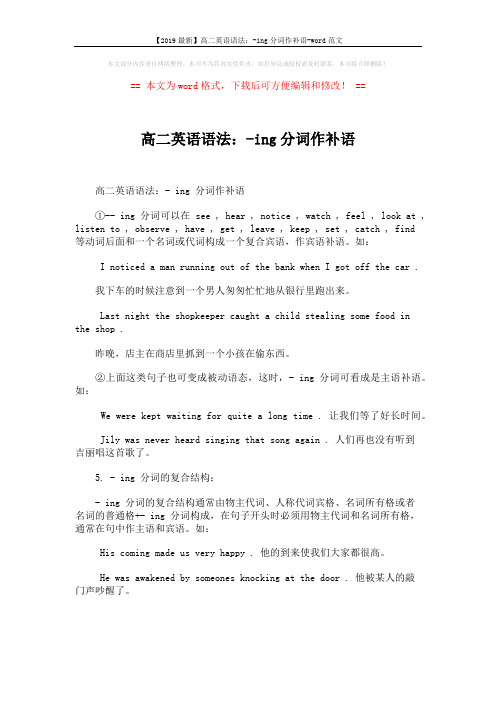
【2019最新】高二英语语法:-ing分词作补语-word范文本文部分内容来自网络整理,本司不为其真实性负责,如有异议或侵权请及时联系,本司将立即删除!== 本文为word格式,下载后可方便编辑和修改! ==高二英语语法:-ing分词作补语高二英语语法:- ing 分词作补语①-- ing 分词可以在 see , hear , notice , watch , feel , look at , listen to , observe , have , get , leave , keep , set , catch , find 等动词后面和一个名词或代词构成一个复合宾语,作宾语补语。
如:I noticed a man running out of the bank when I got off the car .我下车的时候注意到一个男人匆匆忙忙地从银行里跑出来。
Last night the shopkeeper caught a child stealing some food in the shop .昨晚,店主在商店里抓到一个小孩在偷东西。
②上面这类句子也可变成被动语态,这时,- ing 分词可看成是主语补语。
如:We were kept waiting for quite a long time . 让我们等了好长时间。
Jily was never heard singing that song again . 人们再也没有听到吉丽唱这首歌了。
5. - ing 分词的复合结构:- ing 分词的复合结构通常由物主代词、人称代词宾格、名词所有格或者名词的普通格+- ing 分词构成,在句子开头时必须用物主代词和名词所有格,通常在句中作主语和宾语。
如:His coming made us very happy . 他的到来使我们大家都很高。
He was awakened by someones knocking at the door . 他被某人的敲门声吵醒了。
动词-ing形式作定语表语和宾补

动词-ing 形式
●动词-ing形式分类:动名词和现在分词 ●动名词和现在分词的区别
●动名词在句子中的作用:作主语、宾语、 表语、定语
●现在分词在句中的作用:作表语、定语、 补语、状语
微风中轻轻摇曳。
二、-ing形式作宾语补足语 1.1) 动词-ing形式作宾语补足语常放 在宾语后面,表示一个正在进行的 主动性的动作,强调一个过程或一 种状态。如:When we returned to the school, we found a stranger standing at the entrance.
●动词-ing形式分类:动名词和现在分词
▲动名词
1、Singing is our hobby. (作主语) 2、We don't allow falling asleep in class. (作动词的宾语)
3、Thanks for your understanding.
4、My job is teaching English. ▲现在分词 1.The students are surprised at the news.
那老板让工人整夜地工作。
2)当主句转换为被动结构时, 原 来作宾语补足语的动词-ing形式便
转换为主语补足语。如:
They found the result very satisfying. = The result is found very satisfying.
这个结果很令人满意。
They heard him singing in the next room. = He was heard singing in the next room. 有人听到他在隔壁房间唱歌。 We mustn’t keep them waiting. = They mustn’t be kept waiting. 千万不能让他们等。
动词ing作定语状语补语的作文

动词ing作定语状语补语的作文一、分词在句子中作状语,可以表示时间、条件、原因、结果、让步、伴随等。
分词(短语)作状语时,其逻辑主语应与句中主语相一致。
当现在分词表示的动作发生在谓语动词之前时, 则用现在分词的完成式;当所表示的动作与谓语的动作同时发生, 则用现在分词的一般式。
完成或被动关系用过去分词。
二、现在分词并作状语时,其逻辑主语必须与句子的主语一致,但有时现在分词的主语与其所在句中的主语并不一致,这种现在分词即为所谓的垂悬现在分词。
垂悬现在分词难并使句意模糊不清,甚至导致歧义,因而通常被指出就是相左规范或错误的用法。
1.Searching along the deck,it had taken him some time to find a doctor.他沿着甲板打听了好久才找出一名医生。
(searching的逻辑主语就是句中的him)2.Walking or sleeping,this subject was always in my mind.不论是走路或睡,我总是在想著这个问题。
(walking or sleeping的逻辑主语就是句中的my)3.Traveling is interesting but tiring.旅行就是有意思的,但是并使人烦躁4.The pupils will get confused if they are made to learn too much.如果使学生研习得太多,他们可以深感迷糊的。
5.The argument is very convincing.他的论点很令人信服。
6.They were very excited at the news.听见这个消息,他们非常兴奋。
三、现在分词或过去分词作状语时,有时可以在分词前加while,when, once, although, until, if等连词。
1.When leaving the airport, she waved again and again to us.2.While waiting for the train, I had a long talk with my sister about her work……3.Once recovered, he threw himself into his work and made every effort to do it well.4.Although working very hard, he failed to pass the final exam.5.If translated word by word, the passage will be difficult to understand.现在分词作伴随状语例句1:Smoking a cigarette , he entered the meeting hall.他抽着烟,走进了会议厅。
动词ing做宾补-表语-定语-状语及综合练习

动词ing做宾补-表语-定语-状语及综合练习2高中英语语法动词ing形式做宾补表语定语状语用法详解及练习第一部分:动词的-ing形式作宾语补足语1.动词的-ing形式可以在see, hear, notice, watch, feel, smell, look at, listen to, observe, find 等表示感官和心理状态的动词后面作宾语补足语,和一个名词或代词一起构成复合宾语。
We heard the children shouting upstairs. 我们听见孩子们在楼上叫喊。
I noticed a man running out of the bank when I got off the car. 我下车的时候注意到一个男人从银行里跑出来。
I felt my heart beating violently. 我觉得我的心在猛烈地跳动。
2.动词的-ing形式和不定式作宾语补语的区别在see, hear, feel, watch, notice等感官动词后,既可用动词的-ing形式构成复合宾语,也可用不定式构成复合宾语,两者之间有一定的区别。
用动词的-ing形式时,表示动作正在进行;用不定式时,表示动作发生了,即动作的全过程结束了。
He saw a girl getting on the car. 他看见一个女孩在上汽车。
(She was getting on the car.)He saw a girl get on the car and drive off. 他看见一个女孩上车开走了。
(She got on the car and drove off.)Do you hear someone knocking at the door 你听见有人在敲门吗?(Someone is knocking at the door.)Do you hear someone knock at the door 你听见有人敲门了吗?(Someone knocked at the door just now.)提示:如果宾语补足语是一系列的动作,通常只能用不定式来表示,不用动词的-ing形式。
ing形式常见考点归纳
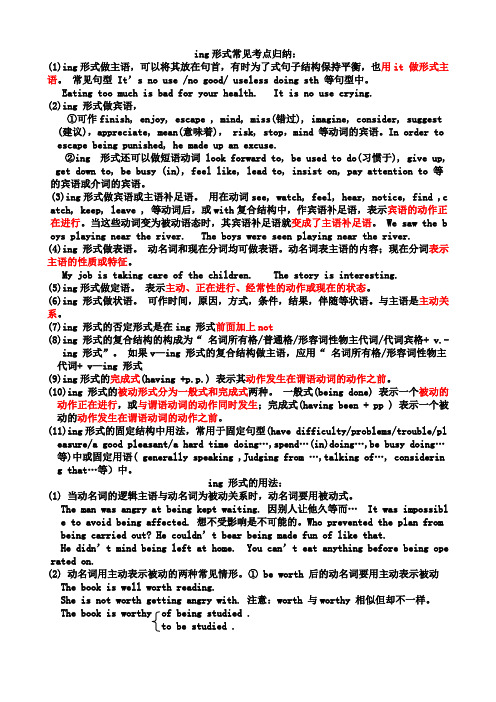
ing形式常见考点归纳:(1)ing形式做主语,可以将其放在句首,有时为了式句子结构保持平衡,也用it 做形式主语。
常见句型It’s no use /no good/ useless doing sth 等句型中。
Eating too much is bad for your health. It is no use crying.(2)ing 形式做宾语,①可作finish, enjoy, escape , mind, miss(错过), imagine, consider, suggest (建议),appreciate, mean(意味着), risk, stop,mind 等动词的宾语。
In order to escape being punished, he made up an excuse.②ing 形式还可以做短语动词 look forward to, be used to do(习惯于), give up, get down to, be busy (in), feel like, lead to, insist on, pay attention to 等的宾语或介词的宾语。
(3)ing形式做宾语或主语补足语。
用在动词see, watch, feel, hear, notice, find ,c atch, keep, leave , 等动词后,或with复合结构中,作宾语补足语,表示宾语的动作正在进行。
当这些动词变为被动语态时,其宾语补足语就变成了主语补足语。
We saw the b oys playing near the river. The boys were seen playing near the river. (4)ing 形式做表语。
动名词和现在分词均可做表语。
动名词表主语的内容;现在分词表示主语的性质或特征。
My job is taking care of the children. The story is interesting.(5)ing形式做定语。
动名词与现在分词用法的区别
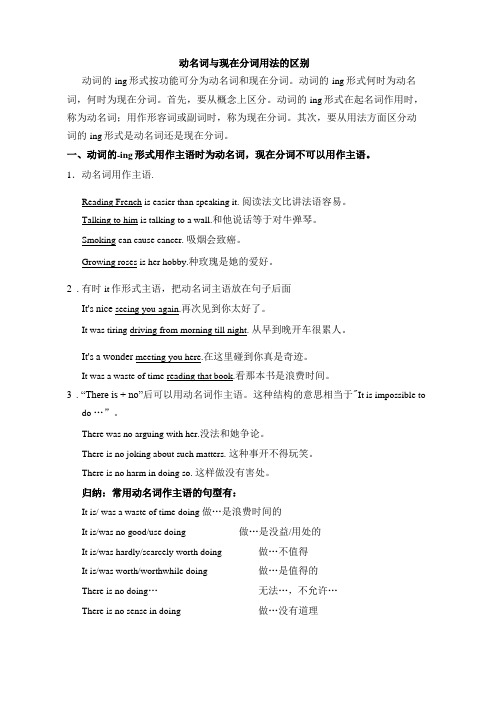
动名词与现在分词用法的区别动词的-ing形式按功能可分为动名词和现在分词。
动词的-ing形式何时为动名词,何时为现在分词。
首先,要从概念上区分。
动词的-ing形式在起名词作用时,称为动名词;用作形容词或副词时,称为现在分词。
其次,要从用法方面区分动词的-ing形式是动名词还是现在分词。
一、动词的-ing形式用作主语时为动名词,现在分词不可以用作主语。
1.动名词用作主语.Reading French is easier than speaking it. 阅读法文比讲法语容易。
Talking to him is talking to a wall.和他说话等于对牛弹琴。
Smoking can cause cancer. 吸烟会致癌。
Growing roses is her hobby.种玫瑰是她的爱好。
2.有时it作形式主语,把动名词主语放在句子后面It's nice seeing you again.再次见到你太好了。
It was tiring driving from morning till night. 从早到晚开车很累人。
It's a wonder meeting you here.在这里碰到你真是奇迹。
It was a waste of time reading that book.看那本书是浪费时间。
3. “There is + no”后可以用动名词作主语。
这种结构的意思相当于"It is impossible todo …”。
There was no arguing with her.没法和她争论。
There is no joking about such matters. 这种事开不得玩笑。
There is no harm in doing so. 这样做没有害处。
归纳:常用动名词作主语的句型有:It is/ was a waste of time doing 做…是浪费时间的It is/was no good/use doing 做…是没益/用处的It is/was hardly/scarcely worth doing 做…不值得It is/was worth/worthwhile doing 做…是值得的There is no doing…无法…,不允许…There is no sense in doing 做…没有道理There is/was no use doing 干…无意义There is/was no point doing 干…无意义①我们不知道要去哪儿。
动词ing形式

动词ing形式动词ing形式如何区别动名词和现在分词动名词和现在分词的构成相同,即动词原形+ing。
那么,在使⽤的过程中如何区别它们呢?⼀、⽤法不同动词除具有动词的特征外,还有名词的特征,在句⼦中可以作主语、表语、宾语、定语等;⽽现在分词除具有动动词的特征外,还具有形容词的特征,在句⼦中可以作定语、表语、状语、补语等。
⼆、区分⽅法:1.如果-ing形式在句⼦中作状语和补语,那么它⼀定是现在分词。
例如:She saw Jim playing with the cat.Having finished his homework, he went out to play.2.如果-ing形式在句⼦中作主语、宾语和同位语,那么它⼀定是动名词。
例如:Smoking is harm to your body.I like swimming.His aim, going to college, will come true.3.作定语的区分⽅法:如果被修饰的名词与-ing形式有逻辑上的主谓关系,即都表⽰所修饰的⼈或物所发出的动作,那么它就是现在分词;如果没有,那么它就是动名词。
例如:Do you like sleeping cars?(动名词)The sleeping girl is my little sister.(现在分词)4.作表语的区分⽅法:如果-ing形式相当于⼀个形容词,表⽰主语的性质或特征,和主语的位置不能互换,那么-ing形式就是现在分词;如果-ing 形式相当于⼀个名词,与主语处于同等地位,可以与主语互换位置,那么-ing 形式就是动名词。
例如:Her job is feeding these animals.(这句话可以改为:Feeding these animals is her job.因此,feeding是动名词。
)The book is interesting.(这句话不可以改为:Interesting is the book.所以,interesting 是现在分词。
ing的用法规则口诀 -回复

ing的用法规则口诀-回复Ing的用法规则口诀:动名词、进行时、状语从句,要用动词ing。
不及物、特殊、出现主语,后面ing才分。
动名词的用法规则口诀:动词变“名词”,ing结尾就行。
主语非动作受伤,强调活动ing。
做主语的常加定语,用of短语组合。
和to不定式比较起来,有主语则用ing。
进行时的用法规则口诀:表示正在、进行中,句中加“be”。
句中主语是重点,动词变成ing。
修辞手法可用的,强调动作ing。
表示将来要发生,进行时用来表。
状语从句的用法规则口诀:时间原因地点状语,当在句首。
说这话要加ing,状语从句带“=”。
表示伴随时用ing,要跟在动词后。
如果主句用情态动词,状语从句ing省。
不及物的用法规则口诀:不需要宾语,自己就能动。
直接加ing,变成现在分词。
有些动词既及物,又不及物。
加ing表仅仅,不加宾补。
特殊的用法规则口诀:宾补是doing的,叫做复合宾语。
stop后加ing,其他动词加doing。
有些动词后面加形容词,带有-ing。
带有-ing的形容词作定语。
出现主语的用法规则口诀:doing作主语,动名词用来表。
doing后面跟动作,不及物再加上。
俩名词连在一起,即变为复合形式。
分词本身可引导,有时也要把宾补引导。
以上是关于“ing”的用法规则的口诀。
接下来,我将详细解释和举例说明每个规则的用法。
动名词的用法规则口诀是指,当动词加上ing结尾时,可以表示动作的名词。
这种用法的动名词可以作为句子的主语、宾语或者补语等。
例如:- Swimming (动名词作主语) is a great exercise. (游泳是一种很好的运动。
)- I enjoy (动名词作宾语) dancing in my free time. (我喜欢在我闲暇的时间跳舞。
)- My favorite hobby is (动名词作表语) painting. (我最喜欢的爱好是绘画。
)- He is not used to (动名词作宾补) public speaking. (他不习惯公开演讲。
说话的ing形式-概述说明以及解释

说话的ing形式-概述说明以及解释1.引言1.1 概述说话的ing形式是指在一句话中使用动词+ing的结构来表达某个动作或状态正在进行中。
这种形式在英语中非常常见,并且被广泛应用于口语交流、书面语和文学作品中。
使用ing形式可以使我们的说话更具体、更生动、更有画面感,能够更好地传达我们正在经历的事情或描述某物的外观、性质等。
通过使用ing 形式,我们能够将听众或读者带入到我们所表达的场景中,使他们更能够感受到我们想要传达的信息。
此外,使用ing形式还能够让我们的语言更加灵活多样。
它可以在句子中作为主语、宾语、表语或状语等,并且可以与其他的时态和语态相结合,从而丰富了我们的表达方式。
通过灵活运用ing形式,我们能够更好地表达我们的思想和情感,使我们的语言更具有说服力和表现力。
然而,使用ing形式也需要注意一些细节。
在句子中使用ing形式时,我们需要注意时态的一致性,避免产生混淆。
此外,我们还需要注意虚拟语气的使用,以及宾语和介词的正确搭配。
只有正确地运用这些语法规则,我们才能使我们的表达更加准确、流畅。
通过对说话的ing形式的概述,我们可以明确了解到这种形式的作用和特点。
在接下来的文章中,我们将深入探讨ing形式的用途、语法特点以及注意事项,以帮助读者更好地理解和运用这种形式。
1.2 文章结构文章结构部分的内容:本文将分为引言、正文和结论三个部分来展开对说话的ing形式的探讨。
在引言部分中,我们将概述说话的ing形式的基本概念和意义,介绍文章的结构安排,以及文章的研究目的。
在正文部分中,我们将首先解释什么是ing形式,其次探讨ing形式在语言中的各种用途,然后分析ing形式在语法中的特点,最后总结使用ing形式时需要注意的事项。
在结论部分中,我们将总结ing形式在说话中的重要性,展望其在今后应用中的前景,以及对说话技巧的启示,最终得出结论陈述。
1.3 目的本篇文章的目的是探讨和介绍说话中的ing形式的使用。
动词ing形式六大易错点
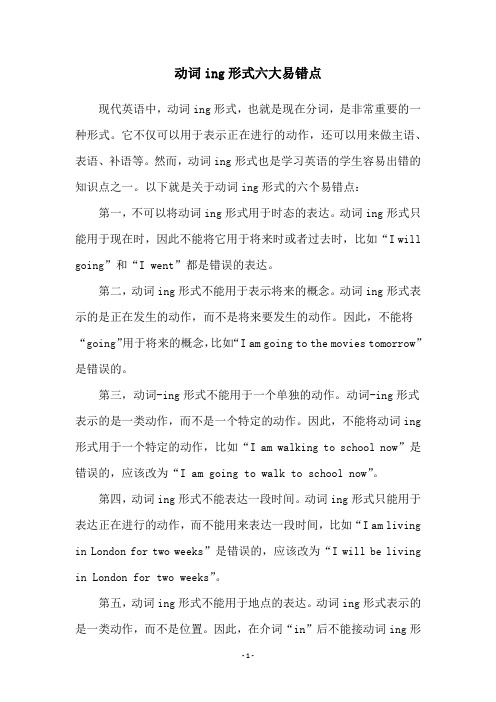
动词ing形式六大易错点现代英语中,动词ing形式,也就是现在分词,是非常重要的一种形式。
它不仅可以用于表示正在进行的动作,还可以用来做主语、表语、补语等。
然而,动词ing形式也是学习英语的学生容易出错的知识点之一。
以下就是关于动词ing形式的六个易错点:第一,不可以将动词ing形式用于时态的表达。
动词ing形式只能用于现在时,因此不能将它用于将来时或者过去时,比如“I will going”和“I went”都是错误的表达。
第二,动词ing形式不能用于表示将来的概念。
动词ing形式表示的是正在发生的动作,而不是将来要发生的动作。
因此,不能将“going”用于将来的概念,比如“I am going to the movies tomorrow”是错误的。
第三,动词-ing形式不能用于一个单独的动作。
动词-ing形式表示的是一类动作,而不是一个特定的动作。
因此,不能将动词ing 形式用于一个特定的动作,比如“I am walking to school now”是错误的,应该改为“I am going to walk to school now”。
第四,动词ing形式不能表达一段时间。
动词ing形式只能用于表达正在进行的动作,而不能用来表达一段时间,比如“I am living in London for two weeks”是错误的,应该改为“I will be living in London for two weeks”。
第五,动词ing形式不能用于地点的表达。
动词ing形式表示的是一类动作,而不是位置。
因此,在介词“in”后不能接动词ing形式,比如“I am in going to school”是错误的,应该改为“I am going to school”。
第六,动词ing形式不能用于表达比较。
动词ing形式表示的是一类动作,而不能用于表达比较。
因此,不能将“running”用于比较,比如“He is the running faster than me”是错误的,应该改为“He is running faster than me”。
高二英语动词ing用法归类总结
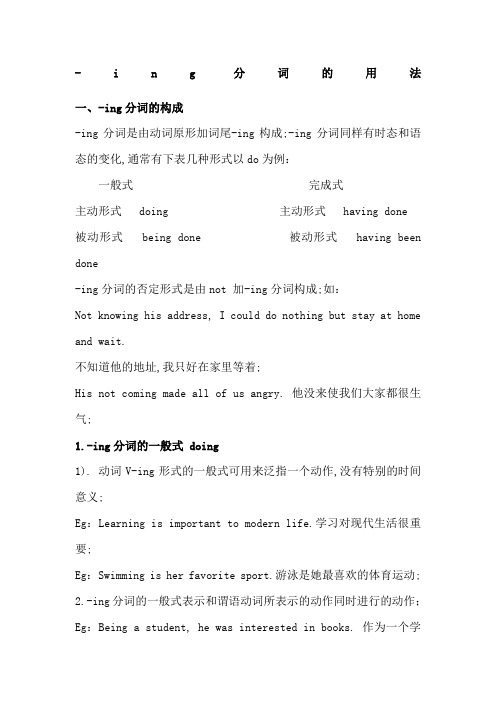
-i n g分词的用法一、-ing分词的构成-ing分词是由动词原形加词尾-ing构成;-ing分词同样有时态和语态的变化,通常有下表几种形式以do为例:一般式完成式主动形式 doing 主动形式 having done被动形式 being done 被动形式 having been done-ing分词的否定形式是由not 加-ing分词构成;如:Not knowing his address, I could do nothing but stay at home and wait.不知道他的地址,我只好在家里等着;His not coming made all of us angry. 他没来使我们大家都很生气;1.-ing分词的一般式 doing1). 动词V-ing形式的一般式可用来泛指一个动作,没有特别的时间意义;Eg:Learning is important to modern life.学习对现代生活很重要;Eg:Swimming is her favorite sport.游泳是她最喜欢的体育运动;2.-ing分词的一般式表示和谓语动词所表示的动作同时进行的动作;Eg:Being a student, he was interested in books. 作为一个学生,他对书本很感兴趣;Eg:They went out of the classroom, talking and laughing. 他们有说有笑地走出教室;2.-ing分词完成式 having done:完成式表示动作在谓语动词所表示的动作之前发生的动作;Eg:Not having studied his lessons very hard, he failed the examinations. 因为没有努力学习功课,他考试不及格;Eg:Having answered the letter, she went on to read an English novel.Eg:Having lived in this city for three years, she knows it very well.3. -ing分词的被动式 being done :-ing分词的被动式表示它的逻辑主语是-ing分词动作的承受者;被动语态-ing一般式所表示的动作是一个正在进行中的被动动作. Eg:The question being discussed is very important. 正在被讨论的问题很重要;4. having done的被动形式having been done表示它的逻辑主语是动词-ing形式表示的动作的承受者;表示动作在谓语表示的动作之前发生;Eg:Having been criticized by the teacher, he gave up smoking. 被老师批评以后,他把烟戒了;Eg:Having been shown the lab, we were taken to see the schoollibrary.在被带去看了实验室之后,我们又被带去参观校图书馆;5动词-ing形式的否定形式;动词-ing形式的否定形式通常是在其前加not,带有逻辑主语时not 应放在动词-ing形式之前;Eg:Excuse me for my not coming on time.Eg:I’m sorry for not having kept my promise.例1. ______ to the station on time made everyone wor ried last week.A. Him not gettingB. Not his gettingC. His not gettingD. Not getting6.动词-ing形式的复合结构动词ing形式的复合结构由形容词性物主代词或人称代词宾格,名词所有格或普通格加动名词,动名词的复合结构实际上是给动名词加了一个逻辑主语; 动词-ing形式的复合结构有四种形式:①形容词性物主代词+动名词②名词‘s +动名词③代词宾格+动名词④名词+动名词注意动名词的复合结构可在句中作主语或宾语;作主语时,不能用③④两种形式;Eg:Tom’s winning the first prize last year impressed me a lot. 汤姆去年得了一等奖使我印象深刻;Eg:Do you mind my/me/Jack’s/Jack leaving now.翻译练习:His coming made us very happy. 他的到来使我们大家都很高;翻译练习:He was awakened by someone’s knocking at the door. 他被某人的敲门声吵醒了;二 -ing分词的语法作用动词-ing一方面具有动词的性质,另一方面也相当于一个名词或形容词、副词,在句中可以作主语、表语、宾语、定语、状语和补语等; 1–ing分词短语作主语: 动词ing形式作主语往往表示经常性、习惯性的动作,谓语动词用单数:Eg:Reading books widens our knowledge.读书增长我们的知识Eg:Saying is easier than doing. 说比做容易;翻译练习:Learning English well is not easy.在下面两种结构中,-ing分词也作主语;A.It is no use/no good/useless/worthwhile/dangerous/a wa ste of time /fun等后需用动名词作真正的主语;为了保持句子平衡,通常用it 作形式主语,而把真实主语放在句末;Eg:It is no use crying over spilt milk. 覆水难收Eg:It's a waste of time arguing about it. 辩论这事是浪费时间;翻译练习:It is no use waiting for him any longer.B.当句型“There is no doing…”表示“不允许、禁止某种行为的发生或存在”时,需用动名词作主语;Eg:There is no joking about such matters. 这种事开不得玩笑;There is no point indoing sth 干…….没意义; Eg:There’s no point in waiting. 等待是毫无意义的; There is no senseindoing sth. 干…没道理/意义例.1.In my mind,_____ that famous university will be the only way to become a worlds-class writer. A. attending B.to attend C. attendD. having attended2. My grandfather is a millionaire, but _____ money does not solve all his problem.A. hasB. to haveC. havingD. having had2 -ing分词短语作表语:Eg:His hobby is collecting stamps. 他的爱好是收集邮票; Eg:The problem is quite puzzling. 这个问题很令人困惑;3 -ing分词作宾语:①–ing分词可作动词宾语, 作动词的宾语;mind介意, suggest建议, enjoy欣赏,, admit承认, appreciate 感激,欣赏, avoid避免, delay推迟, dislike不喜欢,厌恶, escape 逃脱, finish完成, forgive宽恕, imagine想象, keep保持, miss 错过, practise训练, resist抵抗,抵制, risk冒险, deny拒绝,否认, consider考虑等;Eg:I suggest doing it in a different way. 我建议用另一种方法做这件事;Eg:We enjoy attending Miss Li''s class. 我们喜欢听李老师的课;例1:He got well-prepared for the job interview, for he couldn’t risk _____ the good opportunity.A. to loseB. losingC. to be lostD. being lost答案B.后risk 后接动名词,he与 lose是主谓关系;2:Bill suggested _____ a meeting on what to do for the Shanghai Expo during the vacation.A. having heldB. to holdC. holdingD. hold3.To improve your spoken English, you should practic e_____ it every day. A. speak B. to be spo ken C. speaking D. to speak②-ing分词作宾补,也可用在复合宾语中作真正的宾语,而用it作形式宾语;如:Eg:I don’t think it possible living in such a cold place. 我认为住在这么寒冷的地方是不可能的;Eg:Do you consider it any good trying again 你觉得再试一次会有好处吗③-ing分词作介词宾语,经常用在一些短语的后面;如:Eg:I'm against inviting him to dinner. 我反对邀请他来吃饭; Eg:They don’t feel like walking that much. 他们不喜欢走那么多路;翻译练习:Don’t be afraid of speaking English.不要害怕说英语;此类短语还有很多;如:can’t help忍不住be proud of以……自豪, be responsible for对……负责, insist on坚持, keep on 继续think of考虑,想到, dream of梦想, hear of听说, prevent…from防止,阻止, keep…from防止,阻止, stop…from防止,阻止, be engaged in从事于, depend on依靠,依赖, thank…for因……而道谢, excuse…for因……而道歉, aim at目的在于, set about着手做, be fond of喜欢, be afraid of害怕, be tired of对……厌烦, succeed in成功地做……, be interested in对……感兴趣, be ashamed of对……感到羞愧, put off推迟, give up放弃, be worth值得做……, be busy in doing sth 忙于做某事 ,等等;注意:在有些句子中,介词常可省去;如:Eg:I have no difficulty in communicating with foreigners. 我在和外国人交谈方面没有什么困难;Eg:What can prevent us from getting married 有什么能阻止我们结婚翻译练习: Farmers were busy in getting in the crops. 农民在忙着收庄稼;翻译练习: I have never dreamed of visiting that place. 我从未梦想过要参观那个地方翻译练习: He used to spend a lot of time in playing games. 过去他常花很多时间玩游戏;例1.The girl said that she had never dream of _____a volunteer.A. beB. to beC. beingD. is2. I had great difficulty _____ the suitable food on the menu in that restaurant.A. findB. foundC. to findD. finding3. Seeing the funny scene, I can’t help______.A. laughB. to laughC. laughingD. laughed另外,-ing分词可以和一些介词如in, on, after, against, before, by, for, without, besides等构成短语,在句中作状语;如:Eg:He left ahead of time without saying a word. 他一句话也没说就提前离开了;Eg:Besides cooking and sewing, she had to take care of four children.除了做饭和缝纫以外,她还要照顾四个孩子;Eg:On hearing the news, all the pupils jumped with joy. 一听到这个消息后,所有的学生都高兴得跳了起来;4 -ing分词作定语:①单个的分词作定语一般放在被修饰词的前面,–ing分词作定语可用来说明被修饰的名词的用途和性能;如:reading material 阅读材料 walking stick 手杖 fishing pole 鱼杆flying suit 飞行服 writing table 写字台 listening practice 听力训练reading room 阅览室 swimming pool 游泳池 dining car 餐车sleeping car 卧车 singing competition 歌咏比赛 waiting room 候车室②-ing分词作定语还可以表示所修饰的人或物的动作或状态,在意思上接近一个定语从句,可以表示正在进行的动作,也可表示经常性动作或当时的状态;如:developing countries = countries that are developing 发展中国家a growing city = a city that is growing 发展着的城市Eg:Who is the student standing by the door 站在门边的同学是谁Eg:They lived in a house facing south.=They lived in a house which faces south. 他们住在一所朝南的房子里;翻译练习:坐在我旁边的女孩是我妹妹;The girl sitting beside me is my sister.翻译练习:有人在敲门There is someone knocking at the door.③–ing分词还可以作非限制性定语,相当于一个非限制性定语从句,常用逗号和句子其它部分分开;如:Eg:When she appeared, John, wearing a dirty and worn-out overcoat, ran to her with joy. 当她出现的时候,约翰穿着一件又脏又破的大衣高兴地跑了过去;5 -ing分词做状语:动词-ing形式作状语可以修饰谓语动词或整个句子,可以表示时间、原因、结果、条件、让步、方式或伴随情况等;①.表示时间:-ing分词短语作时间状语,相当于一个时间状语从句,有时可由连词when, while引出;Eg:Turning around, she saw a car driving up.=When she turned around, she saw a car driving up. 她转过身,看见一辆车朝她开来;Eg:While reading the book, he nodded from time to time. 他一边看书,一边不时地点头;翻译练习:看到那些画,他想起了她的童年;Seeing those pictures, she remembered her childhood.翻译练习: 听到这消息时我们高兴地跳了起来;Hearing the news, we jumped with joy.②表示原因:-ing分词短语作原因状语,相当于一个原因状语从句;Eg:Being tired, he could not walk any further.=As he wastired, he could not walk any further. 因为疲倦,他不能再往前走了;Eg:Not knowing his address, I can’t send this book to him. 因为不知道他的地址,我不能把这本书送给他;Eg:Many of us, being so excited, couldn’t go to sleep that night. 因为非常激动,那晚我们许多人都没睡着;翻译练习:因为不知道路,他无法到那里去;Not knowing the way, he could’t go there.翻译练习:因为激动他睡不着;Being excited , she couldn’t go to sleep.③表示结果:–ing分词短语作结果状语;表示一种必然的结果,可扩展为一个含有并列谓语的简单句;The fire lasted nearly a month, leaving nothing v aluable.=The fire lasted nearly a month, and left nothing valuable. 大火持续了近一个月,几乎没剩下什么值钱的东西; Eg:His father died, leaving him a lot of money. 他父亲死了,留给他许多钱;Eg:She was so angry that she threw the toy on the ground, breaking it into pieces.她非常生气,把玩具扔在地上,把它摔成了碎片;④表示伴随.-ing分词作伴随状语,可以放在句子的前面、后面或中间,表示主语的另一个、较次要的动作;如:Eg:I stood by the door, not daring to say a word.=I stood by the door, and did not dare to say a word. 我站在门旁,不敢说一句话;Eg:They stood there for half an hour,watching the stars in the sky. 他们在那儿站了半小时,观察着天上的星星;翻译练习:年轻人跟在老人的后面开始慢慢地走起来;Following the old man, the young people started walking slowly. 翻译练习:他们在那儿站了一个小时观看比赛;They stood there for an hour watching the game.⑤表示条件:动词-ing形式作条件状语,相当于一个条件状语从句;Being more careful, you can make fewer mistakes.=If you are more careful, you can make fewer mis takes. 更细心点,你就会少犯错误;Turning to the left, you ‘ll see the tower.向左转,你就会看到那座塔;翻译练习:如果努力,你就会成功;Working hard, you will succeed.⑥“with/without+名词普通格或代词宾格+-ing分词”结构在句中作状语,表示伴随情况或时间、原因等;如:Eg:His hair became gray with the years passing. 随着时间的推移,他的头发变花白了;Eg:Without anyone noticing, he slipped through the window. 没人注意,他从窗户溜了出去;例1.The storm left, ______ a lot of damage to this area.A. causedB. to have causedC. to causedD. having caused例2.----“You can’t catch me” Janet shouted, ______ away.A. runB. runningC. to runD. ran 例3.It’s necessary to be prepared for a job interview. ______ the answers ready will be of great help.A. To have hadB. Having hadC. HaveD. Having 例 4._____ from other continents for millions of years, Australia has many plants and animals not found in any other country in the world.A. Being separatedB. Having separatedC. Having been separatedD. To be separated例5.Daddy didn’t mind what we were doing, as long as we were together, _____ fun.A. hadB. haveC. to haveD. having 例6.Oil prices have risen by 32 percent since the start of the year, _____ a record $57.65 a barrel on April 4.A. have reachedB. reachingC. to reachD. to be reaching例7.It was unbelievable that the fans waited outside the gym for three hours just _____ a look at the sports stars.A. hadB. havingC. to haveD. have例8._____ more about university course, call 9207463789. A. To find out B. Finding out C. Find out D. Having found out简析:1.D.结果状语,时间有明显先后之分;2.B.伴随状语;3.D.条件状语,有明显时间先后之分;4.C.原因状语,时间有明显先后之分;5.D.伴随状语;6.B.结果状语;7.C.作目的状语;8.A.作目的状语;6 -ing分词作补语:--ing分词可以在see, hear, notice, watch, feel, look at, listen to, observe, have, get, leave, keep, set, catch, find等动词后面和一个名词或代词构成一个复合宾语,作宾语补语;如:Eg:I noticed a man running out of the bank when I got off the car.我下车的时候注意到一个男人匆匆忙忙地从银行里跑出来;Eg:Last night the shopkeeper caught a child stealing some food in the shop.昨晚,店主在商店里抓到一个小孩在偷东西;翻译练习:I saw him going upstairs.我看见他正在上楼;翻译练习:We watched her crossing the street. 我们看着她穿过大街;三. –ing分词作主语和表语时与不定式的区别:1、-ing分词和动词不定式作主语和表语的主要区别在于:在表示比较抽象的一般的多次性行为时多用-ing分词;在表示具体的或一次性的动作,特别是将来的动作时,多用不定式;如:Eg:Smoking is forbidden here. 泛指吸烟这里禁止吸烟;Eg:It’s not good for you to smoke so much. 指你吸烟吸这么多烟对你的身体不好;2、有些动词既能接不定式,又能接-ing分词,含义有所不同;如:Remember doing sth 记得做了某事Remember to do sth 记住要去做某事Forget doing sth 忘记做了某事Forget to do sth 忘记要去做某事Regret doing sth 后悔做了某事Regret to do sth 遗憾要去做某事Mean to do sth 打算做某事Mean doing sth意味着做某事Stop to do sth 停下来去做某事Stop doing sth 停止做某事Try to do sth 努力/企图做某事Try doing sth 试着做某事Eg:Do you remember seeing me before 你记得以前见过我吗Eg:Remember to lock the door when you leave. 离开时要记得锁门;Eg:I try not to think about that. 我尽量不去想那件事;Eg:Would you please try doing that again 请你再试一次好吗Eg:I mean to change it for another one. 我想换成另外一个; 翻译练习:Having finished the exercises, we went on to learn the new words in the next unit.做完练习以后,我们继续学习下一单元的单词;翻译练习:After a short rest, they went on working. 短暂地休息以后,他们又继续工作;翻译练习:Missing the train means waiting for another hour. 错过这班车就意味着再等一个小时;例 1. Never mind. Please try _____ the problem in another way.A. solveB. to solveC. being solvedD. solving例2. When asked by the police, he said that he remembered _____ at the party, but not _______.A. to arrive, leavingB. to arrive, to leaveC. arriving, leavingD. arriving, to leave答案 C.记得来过晚会,用arriving,但是后的动作仍然记得,用leaving.3、动词allow, advise, forbid, permit等可直接跟-ing分词作宾语,不可以接动词不定式作宾语,但可接不定式作宾语补语;如:Eg:We don’t permit smoking here. 我们这儿不允许吸烟;Eg:Please permit me to say a few words. 请允许我说几句话; 例1.---Can I smoke here----Sorry. We don’t allow_____ here.A. people smokingB. people smokeC. to s mokeD. smoking4、动词need, require, want作“需要”解时以及deserve作“值得”解时,后面接-ing分词或不定式的被动式;need / want/require/deserve doing=need/want/require/dese rve to be done Eg:The lake needs repairing/ to be repairedEg:These little children require looking after carefully/to be looked after carefully. 这些小孩需要细心地照料;翻译练习:Your shoes need cleaning/ to be cleaned. 你的鞋需要清洗一下了;翻译练习:The room wants cleaning/to be cleaned. 这个房间需要打扫;例:As a result of the serious flood, two-third of the buildings in the area______.A. need repairingB. needs to repairC. needs repairingD. need to repair5、动词like, hate, prefer等后面,如表示一般性动作,多用-ing 分词;如指特定的具体的某次动作,多用不定式;如:Eg:I like swimming, but I don’t like to swim with you. 我喜欢游泳,但我不喜欢和你一起游泳;Eg:I prefer walking to school every day. 我情愿每天步行去学校;Eg:I prefer to stay at home today. 今天我情愿呆在家里;6、-ing分词作表语的两种不同含义:①-ing分词作表语可以表示主语的内容是什么;Eg:Their job is building houses. 他们的工作是盖房子;Eg:The real question is getting to know the needs of the people. 真正的问题是了解人民的需要;②-ing分词作表语还可以表示主语所具有的特征;如:Eg:This story is very interesting. 这故事很有趣;Eg:The problem is quite puzzling. 这个问题很令人困惑;7、不定式和-ing分词作宾语补语的区别:在see, hear, feel, watch, notice等感官动词后,既可用-ing分词构成复合宾语,也可用不定式构成复合宾语,两者之间有一定的区别;用-ing分词时,表示动作正在进行;用不定式时,表示动作发生了,即动作的全过程结束了;如:Eg:Do you hear someone knocking at the door Someone isknocking at the door. 有人在敲门你听见了吗Eg:Do you hear someone knock at the door Someone knocked at the door just now. 你听见有人敲门了吗8、高中阶段常见的带介词to的短语,后接-ing分词或名词;如:look forward to渴望,盼望admit to承认, contribute to捐助、贡献, get down to着手做, give way to让位于,keep to 坚持、遵守, lead to 导致, take to从事, turn to 求助于, stick to忠于、坚持, point to指向、表明, see to 注意、处理, be used to 习惯于, devote oneself to 献身于, be equal to 胜任的、等于, be familiar to 为……熟悉be/get used to习惯于 object to反对,抗议pay attention to注意 .9、高中阶段有一些固定的-ing分词短语,如:generally speaking 一般来说, judging from…根据……来判断, considering…考虑到……, talking of…谈到……,提到……, supposing…假如……等,它们的逻辑主语和句子的主语不一致;这种短语可以被称之为句子的状语,也可当作一个插入语;如:Eg:Judging from his accent, he must come from Canada. 从他的口音看他一定来自加拿大;Eg:Considering how poor he was, we decided to let him attend the concert for free.考虑到他是多么的穷,我们决定让他免费听音乐会;Exercises:1. The officers narrowly escaped ___________in the hot battle.A. have killedB. to killC. to be killedD. being killed2.___________ the letter, he went out to post it.A. WritingB. Being writingC. Having writtenD. Written3. Don't you remember ___________A. seeing the man beforeB. to see the man beforeC. saw the man beforeD. to have seen the man before4. People couldn't help ___________ the foolish emperor in the procession.A. laugh atB. to laugh atC. laughing atD. laughing on5. We're looking forward ___________ the photo exhibition.A. to visitingB. to visitC. to having visitedD. visiting6. The girl ___________ under that tree is my sister.A. sittingB. sitsC. is sittingD. sat7. This sentence needs ___________ .A. a improvementB. improveC. improvingD. improved8. ___________ anything about the accident, he went to work as usual..A. Not knownB. Known notC. Knowing notD. Not knowing9. The next morning she found the man ___________ in bed, dead.A. lyingB. lieC. layD. laying10. There was terrible noise ___________ the sudden burst oflight.A. followedB. followingC. to be followedD. being followed11. The secretary worked late into the night, ___________ a long speech for the president.A. to prepareB. preparingC. preparedD. was preparing12. "Can't you read " Mary said ___________ to the notice.A. angrily pointingB. and point angrilyC. angrily pointedD. and angrily pointing13. How about two of us ___________ a walk down the gardenA. to takeB. takeC. takingD. to be taking14. ---I must apologize for ___________ahead of time. ---That's all right.A. letting you not knowB. not letting you knowC. letting you know notD. letting not you know15. ---You were brave enough to raise objections at the meeting. ---Well, now I regret ___________ that.A. to doB. to be doingC. to have doneD. having done16. Would you ___________ me your identification card, sirA. mind to showB. mind showingC. trouble to showD. trouble showing17. He suggested ___________ on Saturday.A. to have a meetingB. having a meetingC. a meeting to haveD. that having a meeting18. It is no good ___________ to come now. He is busy.A. if you ask himB. to ask himC. asking himD. that you ask him19. Although punctual himself, the professor was quite used ___________ late for his lecture.A. to have studentsB. for students to beC. for students' beingD. to students' being20. He dressed himself quickly and ___________ his schoolbag, went to school.A. carriedB. to carryC. carryingD. carries21. ___________ for several weeks, the city needed food.A. As having floodedB. being floodedC. Having been floodedD. To flood22. ___________ ill worried my parents greatly.A. I fellB. Me fallingC. My fallingD. I falling23. She is writing a letter to a friend of hers, ___________ him to attend the meeting.A. having invitedB. invitingC. to inviteD. invited24. Our town has dozens of factories, ___________several saw mills.A. includedB. are includingC. are includedD. including25. ___________ the classroom, the students went to theplayground to watch the football match.A. To cleanB. Having cleanedC. CleanedD. Cleaning语法专项练习二1.北京 ________in the queue for half an hour, Tom suddenlyrealized that he had left his wallet at home.A. To waitB. Have waitedC. Having waitedD. To have waited2.上海 According to a recent U.S. survey, children spent up to25 hours a week ______TV.A. to watchB. to watchC. watchingD. watch3.上海 The flu is believed _______ be viruses that like toreproduce in the cells inside the human nose and throat.A. causingB. being causedC. to be causedD. to have caused4.上海 The flowers ______ sweet in the botanic garden attractthe visitors to the beauty of nature.A. to smellB. smellingC. smeltD. to be smelt5.天津 Don’t leave the water ______ while you brush your teeth.A. runB. runningC.being run D. to run6.重庆 They see you as something of a worrier, ______ problemswhich don’t exist and crossing bridges long before you cometo them.A. settlingB. discoveringC.seeing D. designing7.福建The news reporters hurried to the airport, only ______the film stars had left.A. to tellB. to be toldC.telling D. told8.湖南 You were silly not _____ your car.A. to lockB. to have lockedC. lockingD. having locked9.江苏 The man insisted _______ a taxi for me even though I toldhim I lived nearby.A. findB. to findC. onfinding D. in finding10.江苏 The old man, _______ abroad for twenty years, is on theway back to his motherland.A. to workB. workingC. to haveworked D. having worked1-5 D C A C D6---10 A C D A B 11---15 B A C B D 16---20 B B C D C 21---25 C C B D B 1—10 CCCBB CBBCD。
ing的用法

She went on board the train leaving for Shanghai. =She went on board the train, which was leaving for Shanghai. 她乘坐了去上海的火车。 There are two roads before us, one leading to the beach, the other to the park. =There are two roads before us, one which leads to the beach, the other to the park. 在我们面前有两条路,一条通向沙滩,另 一条通向公园。
ing的用法
动词的-ing形式是动词的一种非谓语形式,由 动词原形加-ing构成,包括-ing分词和-ing动名 词。可以在句子中用作主语、表语、宾语、宾 语补语、状语和定语。
一、作主语
1.一般形式 Seeing is believing. 眼见为信。 Coming to Hangzhou by train tkes about 16 hours. 乘火车到杭州要16个小时。
Can you remember?
3.使役动词,如:set, keep, have, get, leave, catch等。如: Can you get my watch going again? 你能使我的表再走起来吗? This sets me thinking. 这使我思考。
ing做补语
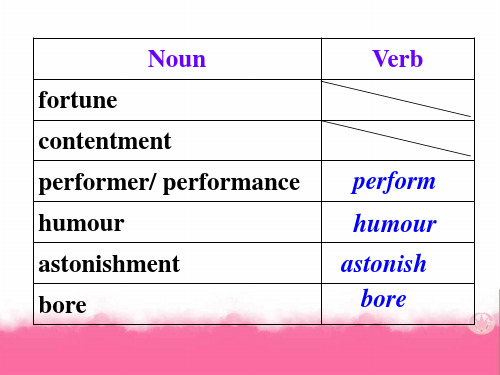
一、v.-ing形式作定语 形式作定语 1. building materials = materials for building drinking water = water for drinking a walking stick = a stick for walking a reading room = a room for reading a writing desk = a desk for writing
Revision v.-ing形式作主语和宾语的用法 形式作主语和宾语的用法 Translate the following sentences into Chinese. 1. Talking to him is talking to a wall. 对他说话等于对牛弹琴。 对他说话等于对牛弹琴。 2. Smoking may cause cancer. 吸烟会致癌。 吸烟会致癌。
They lived in a room facing the street. = They lived in a room that faces the street. The man standing there is Peter’s father. = The man who is standing there is Peter’s father.
动词 ing的用法
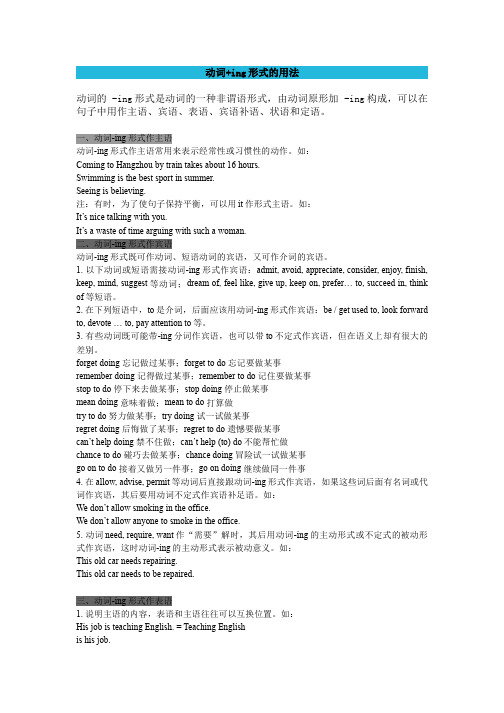
动词+ing形式的用法动词的 -ing形式是动词的一种非谓语形式,由动词原形加 -ing构成,可以在句子中用作主语、宾语、表语、宾语补语、状语和定语。
一、动词-ing形式作主语动词-ing形式作主语常用来表示经常性或习惯性的动作。
如:Coming to Hangzhou by train takes about 16 hours.Swimming is the best sport in summer.Seeing is believing.注:有时,为了使句子保持平衡,可以用it作形式主语。
如:It’s nice talking with you.It’s a waste of time arguing with such a woman.二、动词-ing形式作宾语动词-ing形式既可作动词、短语动词的宾语,又可作介词的宾语。
1. 以下动词或短语需接动词-ing形式作宾语:admit, avoid, appreciate, consider, enjoy, finish, keep, mind, suggest等动词;dream of, feel like, give up, keep on, prefer… to, succeed in, think of等短语。
2. 在下列短语中,to是介词,后面应该用动词-ing形式作宾语:be / get used to, look forward to, devote … to, pay attention to等。
3. 有些动词既可能带-ing分词作宾语,也可以带to不定式作宾语,但在语义上却有很大的差别。
forget doing 忘记做过某事;forget to do 忘记要做某事remember doing 记得做过某事;remember to do 记住要做某事stop to do 停下来去做某事;stop doing 停止做某事mean doing 意味着做;mean to do 打算做try to do 努力做某事;try doing 试一试做某事regret doing 后悔做了某事;regret to do 遗憾要做某事can’t help doing 禁不住做;can’t help (to) do不能帮忙做chance to do 碰巧去做某事;chance doing 冒险试一试做某事go on to do 接着又做另一件事;go on doing 继续做同一件事4. 在allow, advise, permit等动词后直接跟动词-ing形式作宾语,如果这些词后面有名词或代词作宾语,其后要用动词不定式作宾语补足语。
- 1、下载文档前请自行甄别文档内容的完整性,平台不提供额外的编辑、内容补充、找答案等附加服务。
- 2、"仅部分预览"的文档,不可在线预览部分如存在完整性等问题,可反馈申请退款(可完整预览的文档不适用该条件!)。
- 3、如文档侵犯您的权益,请联系客服反馈,我们会尽快为您处理(人工客服工作时间:9:00-18:30)。
2. He became famous for using a particular form of acting, including mime and farce. using 作介词 的_____ 作介词for的 宾语
3. …But he was loved by all who watched the films for his determination in overcoming difficulties and being kind even when people were unkind to him. overcoming作_________ 作 介词宾语
afraid of doing because they do not want to appear a social ______. On one occasion in failure a restaurant he ordered a steak tartare. When the uncooked meat arrived he was ________ overcome by shame because he could not eat it. He _______ a piece of meat and cut off pretended to ____ a mouthful but instead chew put it into the plant pot beside him. He put other pieces into his pocket.
Throughout the meal he seemed to __________ enjoyment show great __________in his food. He outstanding was such an ___________ performer that when he finished eating his dinner, the waiter offered him the same dish again at on extra charge ______!
4. That was the problem facing Charlie Chaplin in one of his most famous films. facing 作____ 定语 5. He loved it by using nonverbal humor. using 作介词宾语 ________
3. ① We passed by the classmates and saw the teacher making the experiment. We sat an hour and watched the teacher make the experiment. ② We heard the door slam. We heard the door slamming.
3. His brother, working as a teacher, lives in Beijing. = His brother, who is working as a teacher, lives in Beijing. The apple tree, swaying gently in the breeze, had a good crop of fruit. = The apple tree, which was swaying gently in the breeze, had a good crop of fruit.
Revision v.-ing形式作主语和宾语的用法 形式作主语和宾语的用法 Translate the following sentences into Chinese. 1. Talking to him is talking to a wall. 对他说话等于对牛弹琴。 对他说话等于对牛弹琴。 2. Smoking may cause cancer. 吸烟会致癌。 吸烟会致癌。
tiring music = music that is tiring a surprising result = a result that is surprising 2. Anybody swimming in this river will be fined. = Anybody who is swimming in this river will be fined.
2) have, set, keep, get, catch, leave等。 等 I won’t have you doing that. This set me thinking. I’m sorry to have kept you waiting. I can’t get the clock going again. You won’t catch me doing that again.
The film we saw last night is quite moving.
His words are encouraging. Our greatest happiness is serving the people.
Our task is building socialism.
Exercises
三、v.-ing形式作表语 形式作表语 Her hobby is painting. My job is looking after the children. His concern for his mother is most touching. She was very pleasing in her appearance.
二、v.-ing形式作宾语补足语 形式作宾语补足语 1. 1) When we returned to the school, we found a stranger standing at the entrance. We found the snake eating the eggs. I found a bag lying on the ground. The boss kept the workers working the whole night.
一、v.-ing形式作定语 形式作定语 1. building materials = materials for building drinking water = water for drinking a walking stick = a stick for walking a reading room = a room for reading a writing desk = a desk for writing
6. He admitted taking the money. 他承认钱是他拿的。 他承认钱是他拿的。 7. I couldn’t help laughing. 我禁不住笑了起来。 我禁不住笑了起来。 8. Your coat needs brushing. 你的大衣需要刷一下。 你的大衣需要刷一下。
They lived in a room facing the street. = They lived in a room that faces the street. The man standing there is Peter’s father. = The man who is standing there is Peter’s father.
3. Walking is my sole exercise. 散步是我唯一的运动。 散步是我唯一的运动。 4. Talking mends no holes. 空谈无济于事。 (谚)空谈无济于事。 5. I suggest bringing the meeting to an end. 我建议结束会议。 我建议结束会议。
2. 1) see, hear, feel, smell, find, notice, observe, look at, listen to等。 等 We saw a light burning in the window. I felt somebody patting me on the shoulder. Can you smell anything burning? As he spoke, he observed everybody looking at him curiously. Listen to the birds singing. I didn’t notice him waiting.
We must improve our working method. They set up an operating table in a small temple.
China is a developing country.
The student making the experiment is our monitor.
2) They found the result very satisfying. = The result is found very satisfying. They heard him singing in the next room. = He was heard singing in the next room. We Байду номын сангаасustn’t keep them waiting.= They mustn’t be kept waiting.
Adverb fortunately contentedly humorously astonishingly boringly
Adjective charming entertaining
Adverb charmingly entertainingly
2. Answer key for Exercise 2. In the 1990s, Mr. Bean became a star using mime to highlight difficult social situations much as Charlie Chaplin had done. His method of acting was to appear _________, look around and then uncertain do exactly the wrong thing. Children particularly would burst into laughter at _______ his behavior. He always managed to pick out _______ those things that people are
